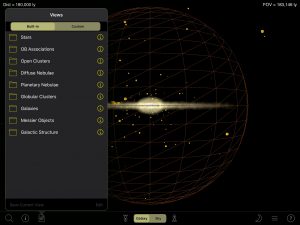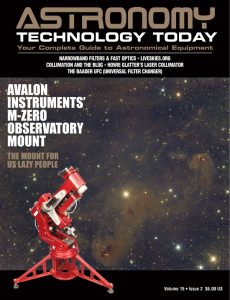Bill Tschumy, formerly with Simulation Curriculum (the SkySafari app), has released Windows and Android versions of the Our Galaxy app in his Beta 2.0 release. The app is designed to help users visualize the locations and physical properties of deep sky objects in and around our Galaxy. The app first launched last year for iOS and macOS. The app will also run in your Web browser.
 The Our Galaxy app serves as a reference to turn to when you read about an object and become curious where it is with respect to our Galaxy. When observing in the field, the app will enhance your observing experience by allowing you to get an intuitive sense of the physical location, size, luminosity, and distance of the object you are viewing. Our Galaxy is also a great educational and outreach tool.
The Our Galaxy app serves as a reference to turn to when you read about an object and become curious where it is with respect to our Galaxy. When observing in the field, the app will enhance your observing experience by allowing you to get an intuitive sense of the physical location, size, luminosity, and distance of the object you are viewing. Our Galaxy is also a great educational and outreach tool.
Using a full 3-D interface, the Galaxy View mode shows you where that cluster or nebula is actually located relative to the center and plane of the Galaxy, providing a unique perspective. Not a static view, it allows you to pan around or fly nearer or farther to get a sense of the objects and where they are.
Using a star map plotted in galactic coordinates, the Sky View mode shows you where the objects you have shown in Galaxy View are found in the night sky. The use of galactic coordinates, rather than the more common alt/az or equatorial coordinates, helps you really understand the relationship between what you see in the night sky and an object’s galactic location.
The Our Galaxy app comes with a number of Built-In Views showing important aspects of our Galaxy. You can easily show things like All Messier Object, OB Associations, Bright Planetary Nebulae, and the structural components of the galaxy such as the Thin Disk. Each built-in view has a short description of the view and why it is interesting making it a great educational tool.
You can create your own Custom Views for later reference or for sharing with others. Your created views may contain your specific notes describing the view.
Objects can be searched for and easily added or removed from the view. You can search either by name or by various criteria (e.g. object class, magnitude, distance, coordinates, or constellation)
When an object is selected, you can show its various apparent and physical properties in the Info panel. You can even initiate a web search of the object for additional information all within the app.
Besides programming, Bill’s other interest is amateur astronomy and astronomy education. In 2009 he got the chance to combine his programming skills with his love of astronomy and co-authored SkySafari, one of the most popular astronomy apps for mobile devices and Macintosh.
Bill has since left the SkySafari project and is now obsessed with understanding where the deep sky objects we observe are actually located in the Galaxy. The Our Galaxy app is the latest result of his efforts.
You can learn more here.
 And to make it easier for you to get the most extensive news, articles and reviews that are only available in the magazine pages of Astronomy Technology Today, we are offering a 1 year magazine subscription for only $6! Or, for an even better deal, we are offering 2 years for only $9. Click here to get these deals which only will be available for a very limited time. You can also check out a free sample issue here.
And to make it easier for you to get the most extensive news, articles and reviews that are only available in the magazine pages of Astronomy Technology Today, we are offering a 1 year magazine subscription for only $6! Or, for an even better deal, we are offering 2 years for only $9. Click here to get these deals which only will be available for a very limited time. You can also check out a free sample issue here.

